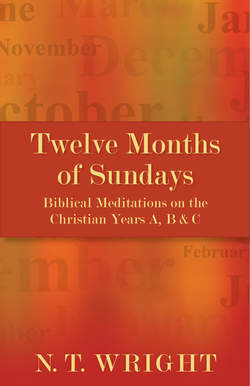Читать книгу Twelve Months of Sundays - N.T. Wright - Страница 50
На сайте Литреса книга снята с продажи.
ОглавлениеProper 9
Genesis 24.34–38, 42–49, 58–67
Romans 7.15–25a
Matthew 11.16–19, 25–30
An American sent me a strange book the other day. Jesus, he argued, was an alcoholic. Roused from his drunkenness by the preaching of John the Baptist, he struggled to kick the habit, and finally made it. Telltale ‘evidence’ is provided by Matthew 11: did they not say that Jesus was ‘a glutton and a drunkard’?
Well, yes, they did, and the early Church wouldn’t have made it up. But the book (which may be a source of hope to some, though I doubt it) misses the point here as much as elsewhere. ‘Glutton and drunkard’ is what, according to Deuteronomy 21.20, the parents of a rebellious son will say of him to the elders of Israel. It is part of a capital charge. Jesus knew that his celebration of the Kingdom with all and sundry was incurring the righteous indignation, and even the condemnation, of the respectable and religious. He was out of line. The Torah had things to say about people like him.
So it did, indeed; but the Torah, the Jewish Law, plays a deeply ambiguous role within the work of Jesus and the subsequent theology of Paul. Romans 7, which is hard enough to get your tongue around, never mind your mind, is the point par excellence where Paul wrestles with the question of why God gave the Law and what its role had been. Here the understanding I seek often eludes me; the misunderstandings I try to avoid come back to haunt me. The best explanation I know runs like this: when Paul says ‘I’ here, he is speaking, with Christian hindsight, of Israel as a whole, Israel under Torah. Israel is right to embrace and celebrate Torah; it is indeed God’s Law, holy and just and good. But Israel, being also ‘in Adam’, innately sinful, finds that the Law condemns. Paul may also be alluding to well-known sayings from pagan moralists about the weakness of the human will. Even the God-given Law cannot rescue Israel from being trapped in sin, just like Aristotle, Ovid or Epictetus.
Paul does not stop with diagnosis. He offers treatment. ‘Thanks be to God, through Jesus Christ our Lord!’ The Law’s condemnation has fallen on sin; this has happened in Jesus’ own flesh (Romans 8.3). Today’s gospel is one more indication of what that meant in practice. Wisdom, said Jesus, is justified by her deeds.
This is what gives Jesus’ invitation to the weary and anxious its peculiar and powerful comfort. It is precisely in his standing alongside the ungodly, the gluttons and drunkards, the outcasts and sinners, precisely in his bearing their condemnation, that the Son chooses to reveal the Father’s very heart, to offer the easy yoke and the light burden. The story of Abraham’s servant, faithful to his master and his master’s God, finding a bride for Isaac, is full of that comfort and hope. The lonely road across the desert can still be the right way to the destination.
